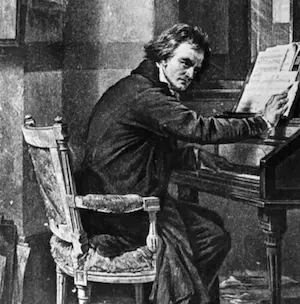About
Ludwig van Beethoven was a German pianist and composer widely considered to be one of the greatest musical geniuses of all time. His innovative compositions combined vocals and instruments, widening the scope of sonata, symphony, concerto and quartet.

Widely regarded as the greatest composer who ever lived, Ludwig van Beethoven dominates a period of musical history as no one else before or since. Rooted in the Classical traditions of Joseph Haydn and Mozart, his art reaches out to encompass the new spirit of humanism and incipient nationalism expressed in the works of Goethe and Friedrich von Schiller, his elder contemporaries in the world of literature; the stringently redefined moral imperatives of Kant; and the ideals of the French Revolution, with its passionate concern for the freedom and dignity of the individual. He revealed more vividly than any of his predecessors the power of music to convey a philosophy of life without the aid of a spoken text; and in certain of his compositions is to be found the strongest assertion of the human will in all music, if not in all art.
Beethoven was the eldest surviving child of Johann and Maria Magdalena van Beethoven. The family was Flemish in origin and can be traced back to Malines. It was Beethoven’s grandfather who had first settled in Bonn when he became a singer in the choir of the archbishop-elector of Cologne; he eventually rose to become Kappellmeister. His son Johann was also a singer in the electoral choir; thus, like most 18th-century musicians, Beethoven was born into the profession. Though at first quite prosperous, the Beethoven family became steadily poorer with the death of his grandfather in 1773 and the decline of his father into alcoholism. By age 11 Beethoven had to leave school; at 18 he was the breadwinner of the family.
Though not himself a Romantic, he became the fountainhead of much that characterized the work of the Romantics who followed him, especially in his ideal of program or illustrative music, which he defined in connection with his Sixth (Pastoral) Symphony as “more an expression of emotion than painting.” In musical form he was a considerable innovator, widening the scope of sonata, symphony, concerto, and quartet, while in the Ninth Symphony he combined the worlds of vocal and instrumental music in a manner never before attempted. His personal life was marked by a heroic struggle against encroaching deafness, and some of his most important works were composed during the last 10 years of his life when he was quite unable to hear. In an age that saw the decline of court and church patronage, he not only maintained himself from the sale and publication of his works but also was the first musician to receive a salary with no duties other than to compose how and when he felt inclined.
